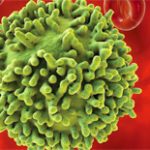“She is a role model for both young women and men embarking on careers in medicine and science. Her legacy of training young lupologists is deep. Many of her mentees have gone on to rheumatology faculty positions, focusing on lupus research.
“Jane has served on the Board of Directors of the American College of Rheumatology and on the NIH advisory boards for the North American Rheumatoid Arthritis Consortium and the Lupus Multiplex Registry. She was co-editor of Arthritis & Rheumatism and is currently an associate editor of the Annals of Rheumatic Diseases, as well as Lupus Science and Medicine.
“Jane has received a number of awards for her outstanding contributions to the field. Among them are the Virginia Kneeland Frantz Award for Distinguished Women in Medicine, and The Carol Nachman Prize in Rheumatology. Now, Jane can add the Hess Award to the list.”
Dr. Salmon Talks about her Research on Lupus & Pregnancy
Dr. Salmon then took the stage to accept the award:
“I am humbled to have been selected to receive the Evelyn V. Hess Award—and immensely grateful for the recognition of my contributions to lupus research by my peers. I also want to acknowledge the LFA. All of us here are grateful for their commitment to the lupus community.
“I first met lupus patients as a rheumatology fellow at HSS. They were my age and faced a mysterious and terrifying disease and a very uncertain future. I felt a kinship with these women. At that time, not so long ago, little was known about lupus, few therapies were available, and lupus research was in its infancy. Indeed, diseases that predominantly affected women were largely overlooked.
“Nonetheless, patients with lupus came to HSS because they knew we were interested in understanding their illness. They are our indispensable partners in research. The thousands of blood samples they donated are a storehouse of data waiting to be deciphered, of mysteries waiting to be solved. This collection enabled us to perform one of the earliest studies of a candidate gene in SLE. We identified variants of FcRII, the first non-MHC genes that could predict severity of disease. We also described the marked increase in prevalence of preclinical atherosclerosis in young women with lupus, an area of intense study by many of you.
‘Patients with lupus came to HSS because they knew we were interested in understanding their illness. They are our indispensible partners in research.’

